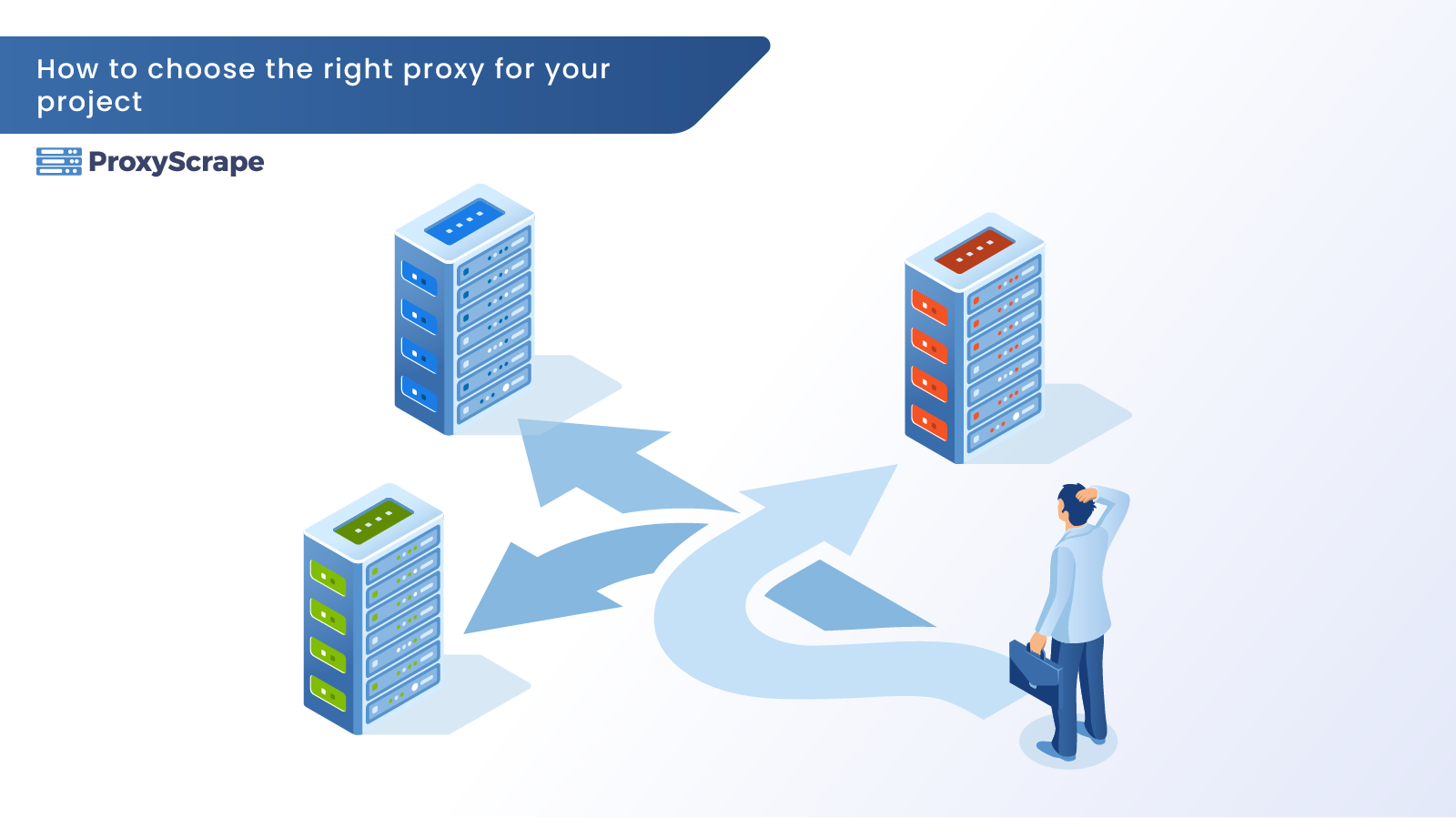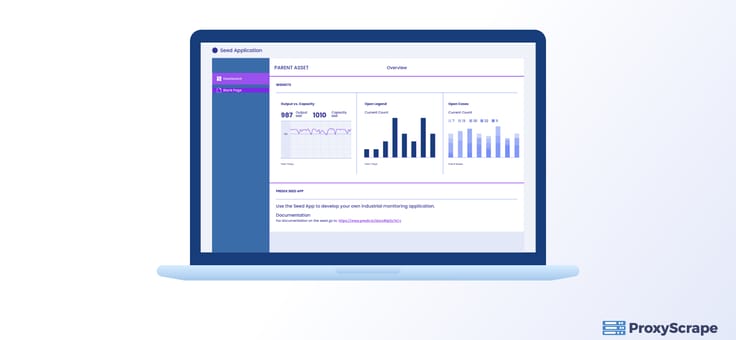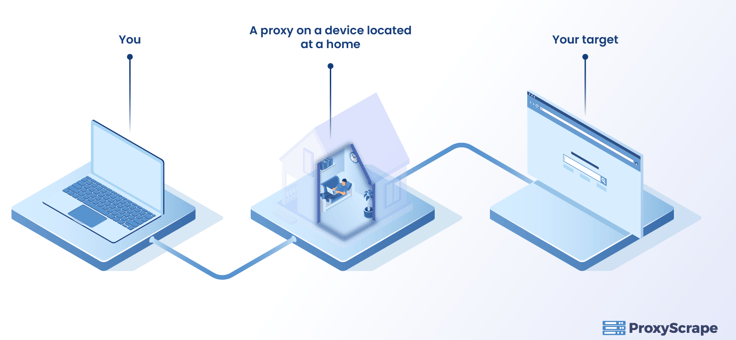
Are you struggling with choosing a suitable proxy for your business or personal need? This can indeed be quite challenging, with tons of proxy providers out there claiming that their solution is the ultimate in addition to the various types of proxies. However, do not worry. We are here to help you choose the suitable
Are you struggling with choosing a suitable proxy for your business or personal need? This can indeed be quite challenging, with tons of proxy providers out there claiming that their solution is the ultimate in addition to the various types of proxies. However, do not worry. We are here to help you choose the suitable proxy, which this article is all about.
Major reasons why you would need a proxy
Since you may already be aware of why you need a proxy, we will not dive deeper into that in this section. However, suppose you are still in doubt; in that case, some real benefits of a proxy are masking your IP address when accessing geo-restricted websites and highly confidential information, enhanced security, web scraping, and controlling internet usage.
You can find more about the benefits of using a proxy by reading this article.

Factors to consider when selecting a proxy
Below we have provided 11 key points that you need to consider when selecting a proxy. They are diverse and classified from technical to nontechnical in no particular order apart from the first key point, knowing your objective. It is better to be educated on these facts based on research before approaching a proxy provider.
So without further ado, let’s look at these facts.
Determine your Purpose- You must know why you would be using a proxy. If you merely want to browse the internet by masking your IP address, then a free proxy would do your job, but you should be aware of the security risks that come with free proxies. However, suppose you are implementing a more advanced task such as web scraping or transferring sensitive information, a dedicated data center proxy, or a residential proxy (we will cover both in the next section) would be more appropriate. On the other hand, for accessing a geo-restricted website, the size of the proxy pool provided by your vendor will matter. So you need to get this fact right.
Location of the Proxy – The location of a proxy server matters in your selection. The closer the proxy server’s location to that of the target device you will be connecting, it will be a catalyst for faster speed. Also, the location factor plays a considerable role when accessing geo-restricted sites. Residential proxies providers usually provide a wide range of locations to choose your proxies. If you need proxies in the least popular countries, you must get the list of countries and cities before making the purchase.
However, a word of caution on this. A list of countries on the provider’s website does not mean that you will be able to select a proxy on your preferred location. This is because some proxy providers do not allow you to choose the proxy’s location and assign it manually by yourself.
Consider the size of the Proxy provider’s IP pool-For instance, let’s say you are working on a project that requires you to connect to the target device several times using different IP addresses to avoid a ban. Then it would be best if you considered a bigger pool of proxies from your provider. The bigger the pool smaller will be the IP blocks. So you need to ask your provider the size of the IP pool if it is not mentioned on their website.
Choose paid proxies instead of free proxies– free proxies are available abundantly and shared by tons of people worldwide, causing high traffic volume. Due to this reason, they are extremely slow. Besides, it isn’t easy to guarantee security in them. It is a widely known fact that free proxies might be created by scammers who want to use your IP address for their agendas. Learn more about the possible security risks of free proxies here.
If, for instance, you still decide to pursue free proxies, make sure to check whether IP addresses are working with online verification tools. However, on the other hand, paid proxies are dedicated to you solely with high-speed connections. Also, you will get a 24/7 guarantee of negligible downtime. So paid proxies by far your go-to choice.

Choose a reliable and legitimate proxy service provider- as mentioned numerous times in this article, there are tons of proxy service providers claiming that the service they provide is the ultimate solution. However, not all are genuine, as some may sell low-quality products that will not get your job done. You can do so by contacting them along with reviews and checking on the dashboard options mentioned below.
Compare prices with several vendors- Price is one of the crucial factors when purchasing a proxy. You need to compare several proxy service providers and determine which one is the most cost-efficient for you. Shared proxies are often cheaper than dedicated proxies but often come with a price to pay.
You need to keep in mind that when you need to transfer more traffic, the higher the price of the proxy would be. The residential proxies thus charge based on the traffic. While there can be certain honest and reliable providers with unlimited traffic, there are others that don’t. This is because some of the providers have a slow speed, although they provide unlimited traffic. However, we at Proxyscrape delivers a very efficient and reliable service with unlimited traffic with faster speeds.You also need to check whether a free testing period is included in your package.
Authorization method – Depending on the type of protocol used on the proxy, other authorization methods are supported. Therefore you need to check which authorization method the proxy service provider provides.
There are mainly two methods of authentication:
- Username and password authentication
- IP authentication
In the case of IP authentication, you need to whitelist your IP address provided by your ISP with the proxy provider. This results in connecting to the proxy server using that particular address only. On a positive note, most proxy providers provide up to 15 different IP addresses. However, some proxy providers may charge extra for whitelisting more than one IP address. So you need to check this factor as well, particularly if you are planning to purchase a dedicated proxy.
Look for Customer Reviews and Testimonials- There is nothing better than seeing the reviews or testimonials pages to view what the current customers say about a proxy service. This would undoubtedly help you to make a better decision on a proxy service.
However, a glitch here is that some proxy providers may post fake reviews as part of their marketing campaign to lure some potential leads. Instead, you could check the reviews in public tech forums or websites such as Quora & Trustpilot.
Take a look at Proxy Providers Dashboard- At first glance, this point may sound awkward. However, this is one of the critical aspects that you should consider when purchasing a proxy. This is because you do not have to contact customer support frequently when you need to change your credentials or purchase proxies, whichever the number is that you desire.
Various dashboard features also add value to the service. In doing so, the provider could increase the price.

The type of IP on the server- Most of the public proxy providers provide both static and dynamic IP addresses which you don’t own, as other users who use them will also have the same address. On the other hand, with private proxies or dedicated proxies, you have more control over. They, too, provide static and dynamic IPs. If you plan to implement web scraping, for instance, where the target device could block your host machine after one or more several attempts in accessing them, then a dynamic IP address will be your ideal choice. This is mainly because you would be able to change your IP and then bypass the lockouts and bans at the target address.
You should also check which version of IP( IPv4 or IPv6) that the provider supports. IPv4 is the older version compared to IPv6, which is the latest version. However, there is more support for IPv4, and you need to select the IP type based on the type of your target websites and their logging type.
Protocols supported by the proxy- when selecting a proxy server, you need to check what protocols they support depending on your requirement. There are HTTP or HTTPS, and then there are SOCKS proxies as well.HTTP protocols transfer HTTP traffic only, whereas SOCKS will transfer any form of traffic and be used explicitly for remote TCP connections. HTTPS, on the other hand, is an enhanced version of HTTP with more security measures.
For a comprehensive overview of the differences between the two proxies, please refer to this article.
Select between Datacenter proxies and Residential proxies
DataCenter and Residential proxies are two of the most common proxies available in the market. Therefore when selecting the suitable proxy for your project, you need to know the differences before making the final decision.
First, let’s briefly describe what they are:
Datacenter – these proxies come from third-party cooperation. Since they originate from cloud service providers, many users might use them simultaneously unless you use dedicated proxies. Since these proxies are not affiliated with an ISP, they can be flagged by some targets. Therefore, you need to take preventive measures.
Residential proxy: These proxies come from an ISP where it assigns its IP address to a residential owner. Unlike the datacenter proxies, these proxies differ in the source of their IP address. They are quite legitimate, harder to get them blacklisted, but above all, they are more expensive. The only security implication of these proxies is that you are viewing content over a person’s private network.

When to use the two proxies
If you are heavily into web scraping, residential proxies would be your ideal choice. This is due to several factors:
Since residential proxies are real people’s IPs, they are less likely to be detected. Datacenter IPs can be easily traceable and can be blocked as they have a subnet mask in the block range.Residential proxies are available in almost any region, city, or country, whereas the datacenter proxies can only be found specific to the data center location.
Datacenter proxies are particularly useful for projects that demand data gathering at a faster phase and cheaply. So, in other words, it is used for small scaling web scraping projects. Other situations where it can be frequently utilized are avoiding geo-blocks and situations where you need to mask your IP address.
The role of Rotating Proxies

Another essential aspect to consider is if your proxy provider provides rotating proxies. Rotating proxies is a technique where your proxy provider assigns a new IP address from the proxy pool to every connection you initiate. For instance, if you like to send 10,000 requests to an unlimited number of websites, you will get 10,000 various IP addresses. Residential IP addresses can also be in the pool of rotating proxies.
Once again, you would need rotating proxies for projects that heavily involve web scraping and tasks related to Search engine optimization (SEO).
How can ProxyScrape help you to select the right proxy
From what you have learned so far in this article in selecting the suitable proxy for your project, ProxyScrape can provide several proxies suited for your needs. These proxies range from residential proxies, dedicated proxies as well as some high-quality datacenter proxies. With the premium proxies, you choose Socks HTTP/HTTPS proxies with unlimited bandwidth.
Please find out more by contacting us.
Conclusion
Now you have discovered that different proxies provide different services. You also now are aware of the different types of proxies needed for specific situations. Most of the factors will depend on your project and your requirement. Therefore, you need to look into multiple aspects that we discussed earlier when finalizing the proxy type.
As far as the proxy provider is concerned, it would help if you made a careful assessment before selecting the provider by asking questions based on the 11 points we have guided you and your research.